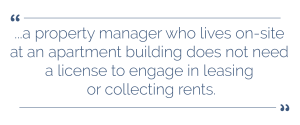

Updated on April 24, 2024
If you have questions like:
Read this post to get an answer to all of your questions about property management requirements by State.
The California Business and Professions Code requires a real estate license to perform most acts related to real estate. However, the State has carved out some exceptions for property managers. Below, we have outlined the basic rules for when the Code requires a property manager to have a real estate license and when the Code provides them with an exemption.
California business and professions code section 10130 sets forth the acts that only a real estate licensee may perform. The list includes a property manager who solicits tenants, negotiates leases or collects rents. (Bus. & Prof. C. § 10131.) This means that most activities that an owner would hire a property manager to carry out would require a real estate license. However, the Code sets out three exceptions to this property manager rule.

First, a property manager does not need a real estate license if they do not engage in either leasing activities or the collection or rents. (Bus. & Prof. C. § 10131.) However, if a property manager is not leasing or collecting rents, he or she will not be able to provide much of a service to the property owner. The other two exceptions prove more useful.
Second, the Code does not apply licensing requirements to “the resident manager of an apartment building, apartment complex… or to the employees of that manager…” (Bus. & Prof. C. § 10131.01(a).) This means that a property manager who lives on-site at an apartment building does not need a license to engage in leasing or collecting rents. Further, employees of that on-site manager do not require a license either. (Bus. & Prof. C. § 10131.01(a).)
Third, the Code does not require a license for off-site persons performing certain activities in connection with residential apartments if that person is an employee of a licensed property manager. (Bus. & Prof. C. § 10131.01(a).) The activities include showing rental units to prospective tenants; dealing with rental applications; accepting deposits, fees, and rents; providing information about rental rates and other terms set forth by the licensed employer; and accepting signed leases from prospective tenants. (Bus. & Prof. C. § 10131.01(a).) While this third exception encompasses most property management duties, it requires a licensed broker or salesperson to supervise and control the persons performing these activities. (Bus. & Prof. C. § 10131.01(b).)
Our Los Angeles based real estate attorneys have handled various property management issues & purchase sale disputes. For help, contact us at (310) 954-1877, [email protected] or by using our Contact Form.